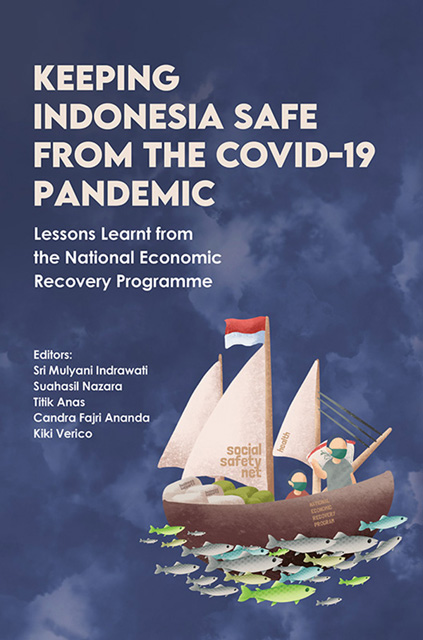 Keeping Indonesia Safe from the COVID-19 Pandemic
Keeping Indonesia Safe from the COVID-19 Pandemic Book contents
- Frontmatter
- Contents
- List of Figures
- List of Tables
- List of Boxes, Annexes and Appendixes
- Acknowledgements
- Glossary
- The Contributors
- Foreword: Keeping Indonesia Safe from the COVID-19 Pandemic Lessons Learnt from the National Economic Recovery Programme
- Part I Health Shock
- Part II Economic Shock: The Framework
- Part III Revenue Shock And Response
- Part IV Expenditure Side (Human Capital)
- Part V Expenditure Side (Msmes And Corporate Sector)
- Part VI Regional Dynamics
- Part VII New Ways Of Working
- Index
11 - COVID-19 and Education in Indonesia: When School Reopening Is Not Enough to Avert Losing a Generation
Published online by Cambridge University Press: 30 June 2023
- Frontmatter
- Contents
- List of Figures
- List of Tables
- List of Boxes, Annexes and Appendixes
- Acknowledgements
- Glossary
- The Contributors
- Foreword: Keeping Indonesia Safe from the COVID-19 Pandemic Lessons Learnt from the National Economic Recovery Programme
- Part I Health Shock
- Part II Economic Shock: The Framework
- Part III Revenue Shock And Response
- Part IV Expenditure Side (Human Capital)
- Part V Expenditure Side (Msmes And Corporate Sector)
- Part VI Regional Dynamics
- Part VII New Ways Of Working
- Index
Summary
INTRODUCTION
Indonesia has made remarkable development progress over the past twenty years, maintaining consistent annual economic growth of 5 per cent and attaining upper-middle-income country status by 2020. The world's tenth-largest economy in terms of purchasing power parity and a member of the G20, Indonesia aspires to become the fifth-largest global economy by 2030. Access to essential services, including education and health, has improved steadily over the last decade. Nonetheless, progress has been uneven, resulting in significant disparities across geographic and income levels and undermining the ability of growth to be truly inclusive. In general, the poor and vulnerable continue to lag. Even though all income groups are achieving better educational achievement, less than one-third of the poorest ten per cent of the population completed basic education in 2018 (Holmemo et al. 2020).
At the same time, Indonesia is in a period of demographic transition which will affect its human capital accumulation and labour market dynamics for decades to come. The working-age population grew by about 24 million from 2013, reaching over 200 million in 2020 (Statistics Indonesia 2021). Currently, half of the population is under the age of 30. Ensuring this generation has a good education and the right skills for employment is critical for the country to increase the productivity of its remaining workforce when the population begins to age in 2025–30. Nevertheless, efforts to improve the quality of human capital are not without challenges. Even before COVID-19, there were problems with learning gaps and disparities in outcomes in the Indonesian education system, which have gotten worse in recent years, especially as an impact of the pandemic.
COVID-19 mitigation measures have resulted in nationwide school closures of at least three months. While the government and educational community worked to maintain learning continuity, students and parents have had to use their own resources to continue learning while away from school, some through the Internet, TV, radio, or completing teacher assignments. At the same time, teachers had to adapt to new pedagogical concepts and teaching methods for which they did not receive any prior formal training. When it comes to the most disadvantaged students, those without access to digital tools or support to learn independently are particularly vulnerable to falling behind.
- Type
- Chapter
- Information
- Keeping Indonesia Safe from the COVID-19 PandemicLessons Learnt from the National Economic Recovery Programme, pp. 352 - 379Publisher: ISEAS–Yusof Ishak InstitutePrint publication year: 2022


